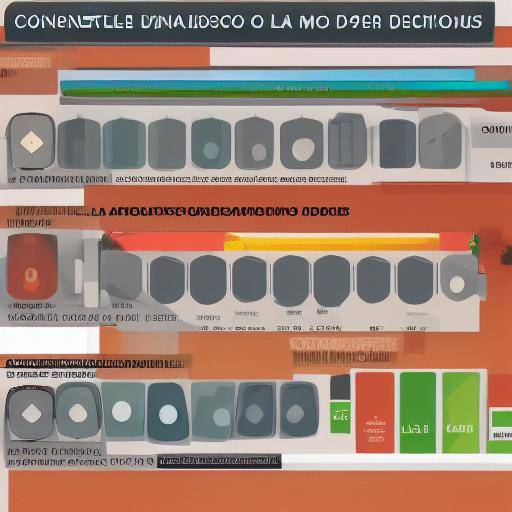
Home insurance is a crucial part to protect your assets against unforeseen events. However, choosing the best home insurance for you can be overwhelming given the large number of options available on the market. In this article, we will provide you with a complete guide to select the home insurance that suits your needs. From the criteria you should consider, through the evaluation of the options, to make an informed decision, you will learn to find the ideal insurance to protect your family space.
Criteria for choosing residence insurance
When choosing home insurance, it is crucial to consider several criteria that guarantee adequate protection for your home. Among the aspects to be considered are:
- Type of coverage: What specific aspects of your house do you want to cover? From fires to thefts, it is essential to evaluate the coverage offered by insurers.
- Policy value: How much are you willing to invest in home insurance? Determining a clear budget will help you compare the options available.
- Reputation of the insurer: Investigate the reputation and financial stability of the insurers. The views of other clients and the qualifications of the specialized agencies can provide valuable information.
- Exclusions and clauses: Carefully analyze the exclusions and clauses of the different home insurance policies to ensure that they meet your needs.
Evaluation of Home Insurance Options
Once you have established the criteria with which you will evaluate the home insurance options, it is time to analyze the alternatives available on the market. To this end, it is essential to conduct a detailed assessment of the different policies offered by insurers. Some aspects to be considered during this stage are:
- Comparison of coverage: Make a detailed comparison of the coverage offered by different insurers to identify those that fit your specific needs.
- Costs and benefits: Evaluate the balance between the cost of policy and the benefits it offers. Not necessarily the cheapest option is the best, as it could be sacrificing fundamental coverage.
- Customer Service: Investigate the quality of the customer service offered by insurers. Speed and efficiency in processing claims is a crucial aspect to consider.
- Views and recommendations: Find opinions and recommendations from other insured people to get a wider view of the experience with each insurer.
Decision-making
After evaluating the options available, it is time to make an informed decision about home insurance that best suits your needs. Some steps to follow during this process are:
- Contact Insurers: Once you have reduced your options, contact the insurers to clarify any doubts and obtain additional information.
- Terms of negotiation: In some cases, it is possible to negotiate the terms of the policy to adapt it to your specific needs. Do not hesitate to explore this possibility.
- Revision of Terms and Conditions: Before making a final decision, carefully review the terms and conditions of the policy to ensure that it understands all the important aspects.
- Recruitment and monitoring: Once you have selected the right residence insurance, proceed with the hiring and make sure you follow all the necessary processes to activate the policy.
Conclusion
Choosing the best domestic insurance requires time, research and analysis. By considering the relevant criteria, evaluating available options and making informed decisions, you will be in an optimal position to effectively protect your home. Remember that protecting your assets is a priority, and choosing the right residence insurance is a crucial step in that path.
Frequently asked questions
1. How can I determine the right type of coverage for my home?
Determining the right type of coverage for your home involves assessing the risks to which your home is exposed, such as fires, theft, water damage, among others. Consider your specific needs and the value of your belongings to determine which coverages are fundamental to your mental peace and security.
2. What aspects should I consider when evaluating the reputation of an insurer?
In assessing the reputation of an insurer, it is important to consider its financial stability, its history in the customer service, and the speed in handling claims. In addition, research on the views of other policy-holders will provide a more comprehensive perspective on the quality of their services.
3. Can I Customize my home insurance policy?
In many cases, insurers offer the possibility of customizing insurance policies to suit their specific needs. Some insurers even allow the addition of additional coverages according to their particular requirements.
4. What should I do if I have doubts about the terms and conditions of politics?
If you have doubts about the terms and conditions of the policy, do not hesitate to contact the insurer for clarification. It is essential to understand all aspects of politics before committing to the contract.
5. What should I do if I want to change my current home insurance policy?
If you want to change your insurance policy at home today, it is advisable to compare options with other insurers and assess whether the coverages and conditions offered best fit your needs. However, it is important to consider any penalty for early cancellation of your current policy.
6. Is it advisable to review my home insurance policy periodically?
Yes, it is advisable to periodically review your home insurance policy, especially with significant changes in your home, such as purchases of valuable items or renovations. Maintaining your updated policy will ensure that you are properly protected at all times.
With this complete guide, you are ready to choose the best home insurance that suits your needs and provides the peace of mind that you deserve. Remember that protecting your home is an investment in your future peace and security.






















































